|
|
|
Sort Order |
|
|
|
Items / Page
|
|
|
|
|
|
|
| Srl | Item |
| 1 |
ID:
120591


|
|
|
|
|
| Publication |
2013.
|
| Summary/Abstract |
I examine a relatively underexplored aspect of Japan's early postwar history and seek to explain why attempts to establish a Japanese-style central intelligence agency (JCIA) in the 1950s were unsuccessful. I evaluate three competing explanations drawn from the level of international politics, focusing on US power resources and influence as well as liberal and constructivist styles of analysis-alliance politics, sectionalism, and the norm of antimilitarism-in order to shed light on the historical origins of Japan's intelligence apparatus, which is relatively underdeveloped and underfunded compared to other middle powers. It highlights the primacy of domestic factors over structural causes in explaining the decision not to establish a JCIA. In particular, I argue that the JCIA proposal failed primarily because of attacks on important proponents that, while sometimes driven by seemingly rational organizational interests, were nevertheless legitimated by growing antimilitaristic sentiments shared by elites from the political center to the left of the ideological spectrum. The newly emerging norm of antimilitarism was predicated largely on a fear of constraints on recently acquired civil and political liberties. These fears, manifested most prominently in vocal Diet and media opposition, were compounded by the norm of secrecy-an important element of intelligence activities-which served to heighten further speculation about the malign intent of postwar Japan's reconstituted intelligence system.
|
|
|
|
|
|
|
|
|
|
|
|
|
|
|
|
| 2 |
ID:
074427
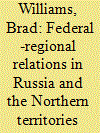

|
|
|
|
|
| Publication |
2006.
|
| Summary/Abstract |
This paper examines a relatively unexplored aspect of the Russo-Japanese territorial dispute: the involvement of subnational actors. It focuses in particular on the sustained campaign of domestic lobbying and paradiplomacy by elites from the Far East region of Sakhalin aimed at preventing the Russian central government from transferring the South Kuril Islands/Northern Territories to Japan during the 1990s. It explores the various responses to the 'Sakhalin factor' from federal authorities in Russia, as well as private and public bodies in Japan, highlighting the subsequent localization and pluralization of diplomatic channels. The paper also considers why the 'Sakhalin factor' became so prominent, pointing to a synergy of factors that include the high-profile anti-concessionary campaigns of the Sakhalin political elite, the fallout from Russia's troubled attempts at state building and a possible convergence of interests between Boris Yeltsin and regional authorities. The paper concludes with an analysis of how Vladimir Putin's federal reforms, launched in 2000, have diminished Sakhalin's authority over the South Kuril Islands.
|
|
|
|
|
|
|
|
|
|
|
|
|
|
|
|
| 3 |
ID:
079409
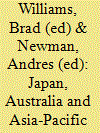

|
|
|
|
|
| Publication |
London, Routledge, 2006.
|
| Description |
xiii, 198p.
|
| Standard Number |
0415381398
|
|
|
|
|
|
|
|
|
|
|
|
Copies: C:1/I:0,R:0,Q:0
Circulation
| Accession# | Call# | Current Location | Status | Policy | Location |
| 052756 | 355.03109520994/WIL 052756 | Main | On Shelf | General | |
|
|
|
|
| 4 |
ID:
072505
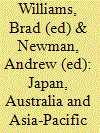

|
|
|
|
|
| Publication |
London, Routledge, 2006.
|
| Description |
xiii, 198p.
|
| Standard Number |
0415381398
|
|
|
|
|
|
|
|
|
|
|
|
Copies: C:1/I:0,R:0,Q:0
Circulation
| Accession# | Call# | Current Location | Status | Policy | Location |
| 051383 | 355.03109520994/WIL 051383 | Main | On Shelf | General | |
|
|
|
|
| 5 |
ID:
182816


|
|
|
|
|
| Publication |
New Delhi, KW Publishers Pvt Ltd, 2021.
|
| Description |
xv, 279p.: ill.pbk
|
| Standard Number |
9789391490591
|
|
|
|
|
|
|
|
|
|
|
|
Copies: C:1/I:0,R:0,Q:0
Circulation
| Accession# | Call# | Current Location | Status | Policy | Location |
| 060124 | 327.1252/WIL 060124 | Main | On Shelf | General | |
|
|
|
|
| 6 |
ID:
128530


|
|
|
|
|
| Publication |
2013.
|
| Summary/Abstract |
This paper sheds light on a relatively unexplored component of Japan's security architecture: the national security secrecy system. Among the protection measures underpinning this system, particular attention is paid to the legal aspects. This system has been caught between two competing pressures. On the one hand, the United States and domestic conservative forces have consistently sought to strengthen what they consider to be an unsatisfactory system of safeguarding national security secrets in Japan. On the other, left-leaning political actors, the media and public opinion, informed by the norm of antimilitarism - understood as a deep distrust of Japan's military establishment and opposition to its foreign deployment, and also broadly predicated on fear of democratic retreat - have been able to thwart these attempts. As a result, Japan lacks a specific anti-espionage or state secrets law and has earned the reputation of a "spy heaven" where foreign agents, domestic collaborators and information leakers have been able to act with seeming impunity. However, rising bilateralism - under which Japan acts to consolidate alliance relations with its superpower patron - in the security and intelligence fields over the past decade and the subsequent pressures from the United States, a dissatisfied ally, facilitated by the rise of regional security threats and a shift in the domestic political terrain, have contributed to an incremental erosion of the antimilitaristic constraints on the legal component of Japan's security secrecy system. Japanese governments have moved to bolster the secrecy protection regime, although reforms are not as significant as what they would be absent residual antimilitarism.
|
|
|
|
|
|
|
|
|
|
|
|
|
|
|
|
| 7 |
ID:
140775
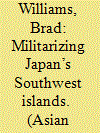

|
|
|
|
|
| Summary/Abstract |
This paper sheds light on a relatively underexplored aspect of Japan’s recent security changes by examining the subnational level where the impact has been far-reaching. It focuses on Japan’s maritime frontier zone: the Yaeyama Islands located at the southwestern end of the Japanese archipelago and administered as part of Okinawa Prefecture. It argues that while Yaeyama militarization has been primarily a national response to China’s portrayed assertiveness in the East China Sea, it has also been facilitated by the strategic actions of local political elites, in cooperation with sympathetic extra-local forces. Political elites from two islands, Yonaguni and Ishigaki, have been motivated primarily by diverging material and ideational factors. Yonaguni elites have viewed militarization largely through the prism of “compensation politics.” Their counterparts in Ishigaki have been driven by more ideological objectives, seeking militarization for deterrence purposes and otherwise transforming the island into a rightist breeding ground in defence of Japanese territory. Yaeyama militarization has not only diminished enthusiasm for seeking autonomy and enhancing economic security through microregional cooperation, but has also enhanced local-level insecurities while creating and exacerbating divisions.
|
|
|
|
|
|
|
|
|
|
|
|
|
|
|
|
| 8 |
ID:
124055
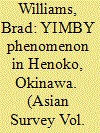

|
|
|
|
|
| Publication |
2013.
|
| Summary/Abstract |
This paper examines the reasons behind Henoko's decision to accept a controversial U.S. military base. It highlights the impact of a path dependency created amid early postwar socioeconomic conditions of deprivation and political compulsion, resulting in the Okinawan village's structural incorporation into the U.S. base economy.
|
|
|
|
|
|
|
|
|
|
|
|
|
|
|
|
|
|
|
|
|